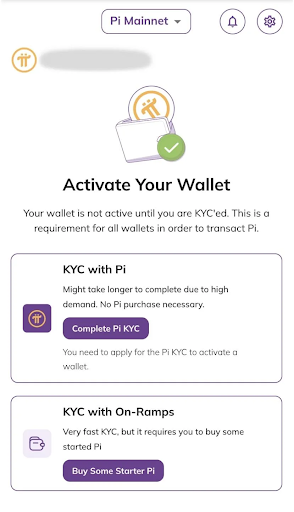In a significant stride toward inclusivity and global adoption, Pi Network has introduced groundbreaking features to broaden access to its Mainnet ecosystem.
Announced on May 2, 2025, these updates allow identity-verified individuals, including fully and tentatively KYC’d Pioneers, to activate their Mainnet wallets without completing the full migration process.
This development, coupled with new onboarding options for non-users through third-party services, marks a pivotal moment in Pi Network’s mission to create the world’s most inclusive peer-to-peer digital economy.
A Leap Toward Inclusivity
Pi Network, launched on March 14, 2019, by Stanford PhDs, has grown into a global community of over 60 million users, driven by its vision of making cryptocurrency accessible to everyone via mobile mining.
Unlike traditional cryptocurrencies that require energy-intensive hardware, Pi enables users to mine coins through a lightweight mobile app, fostering widespread participation.
The recent update to Mainnet wallet activation reflects Pi’s commitment to inclusivity by lowering barriers to entry for both existing Pioneers and newcomers.
Previously, accessing a Mainnet wallet required completing a multi-step migration process, including rigorous identity verification and technical checks.
This process, while ensuring security, delayed participation for many users.
The new feature decouples wallet activation from full migration, allowing Pioneers who have passed any stage of Know Your Customer (KYC) verification to instantly activate their wallets.
This change enables millions of verified users to engage in peer-to-peer transactions, interact with Pi-based applications, and participate in community events like the .pi Domain Auction.
Empowering Newcomers Through Third-Party Onboarding
One of the most transformative aspects of this update is the introduction of third-party onboarding for non-users.
Individuals who did not participate in Pi’s mining phase can now create Mainnet wallets through trusted third-party services, such as Banxa, which has met Pi’s Know Your Business (KYB) standards.
These services conduct KYC verification, allowing newcomers to bypass traditional entry barriers and directly engage with the Pi Mainnet ecosystem.
This approach significantly expands Pi’s reach, inviting a global audience to participate in its blockchain-powered economy.
Unlike non-users who transact Pi on centralized exchanges without owning Mainnet wallets, those onboarded through these third-party services will possess wallets on the Pi blockchain.
This distinction enables them to directly contribute to Pi’s ecosystem by using apps, engaging in local commerce, and participating in network events, fostering a more vibrant and utility-driven platform.
Maintaining Security Amid Expanded Access
Despite the simplified access, Pi Network remains steadfast in upholding stringent security standards. KYC verification, a cornerstone of Pi’s ecosystem, ensures that only authentic individuals participate in the Mainnet, safeguarding the network against bots and fraudulent accounts.
The delegation of KYC processes to trusted third parties, such as Banxa, is a strategic move to enhance scalability while maintaining these standards. This pilot program aims to streamline onboarding, increase transaction volumes, and support the network’s goal of real-world adoption.
Boosting Ecosystem Growth and Developer Opportunities
The expanded access to Mainnet wallets is poised to inject new energy into Pi’s ecosystem. With millions of users now able to activate wallets, developers and app creators can expect increased engagement, higher transaction volumes, and valuable feedback to refine their applications.
The update also encourages developers to experiment with smart contracts and decentralized applications (dApps), strengthening the ecosystem ahead of the Open Mainnet phase, scheduled for February 20, 2025.
Events like PiFest 2024, which connected over 950,000 Pioneers with 27,000 active sellers across 160 countries, demonstrate Pi’s potential for real-world utility.
The new wallet activation features will further accelerate such community-driven economic activity, particularly in emerging markets where Pi tokens are already used for informal exchanges of goods and services.
Implications for Financial Inclusion
A key dimension of this update is its focus on financial inclusion. Many Pi users reside in regions with limited access to traditional banking infrastructure, such as Sub-Saharan Africa, Southeast Asia, and Latin America.
By lowering the activation barrier, Pi Network provides an alternative for peer-to-peer transactions, barter systems, and micro-entrepreneurship.
This aligns with Pi’s broader vision of empowering individuals worldwide through a decentralized and user-friendly platform.
Looking Ahead: The Road to Open Mainnet
As Pi Network progresses toward its Open Mainnet launch, these updates lay a strong foundation for scalability and global adoption.
The decoupling of wallet activation from full migration not only enhances user participation but also positions Pi as a serious contender in the blockchain space.
By fostering a larger user base, supporting developers, and integrating third-party services, Pi is building a robust, utilities-driven ecosystem that prioritizes accessibility, security, and real-world utility.
Pioneers and newcomers alike are encouraged to complete KYC verification, activate their Mainnet wallets, and engage with Pi apps through the Pi Browser. As the network continues to evolve, these steps will be crucial in realizing Pi’s vision of a decentralized digital economy accessible to all.
For more information, visit the official Pi Network blog or trusted third-party services listed on Pi’s KYB services webpage.


